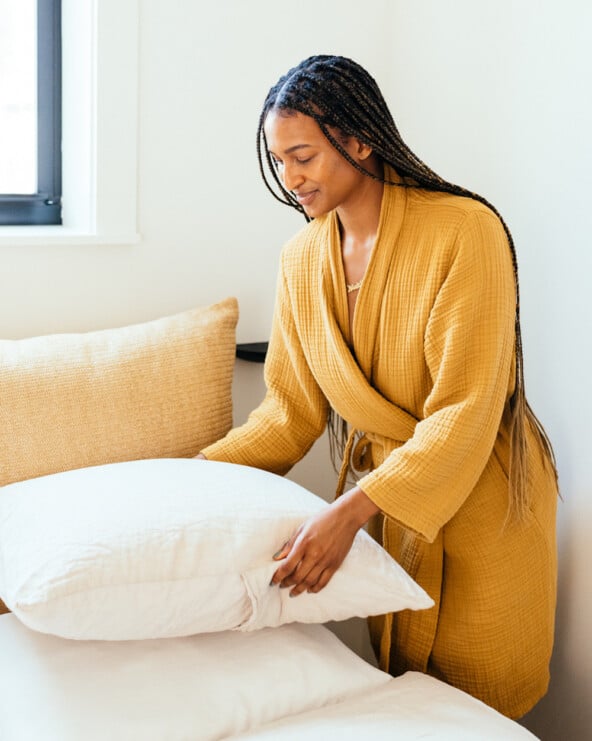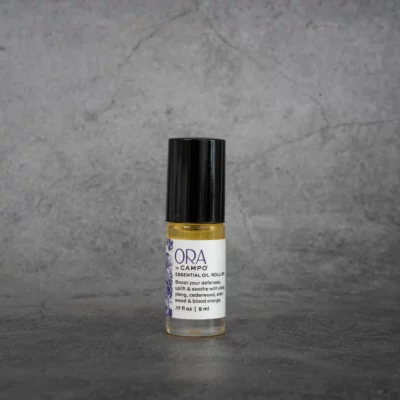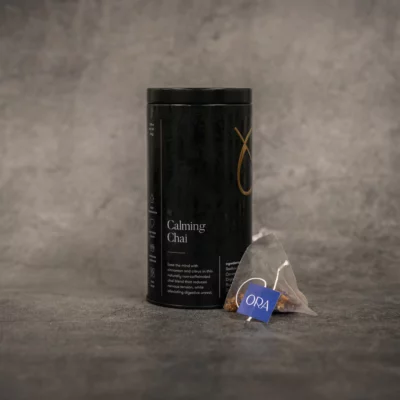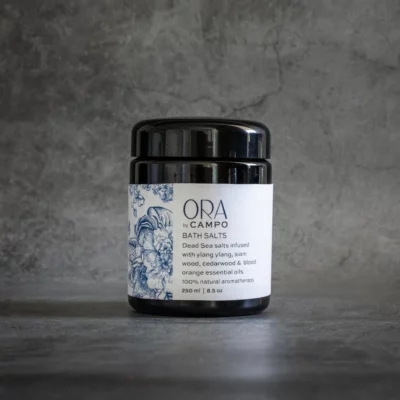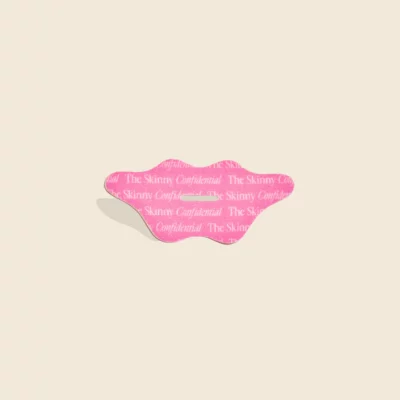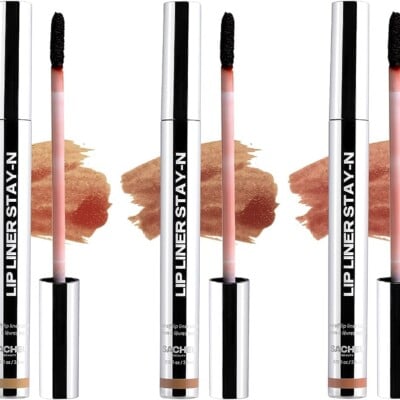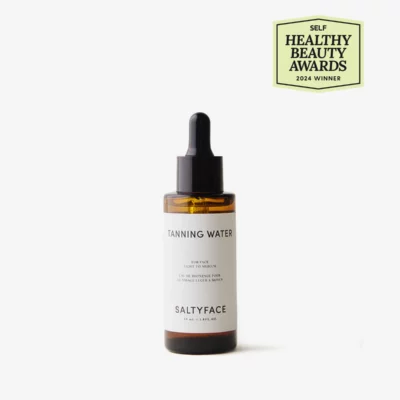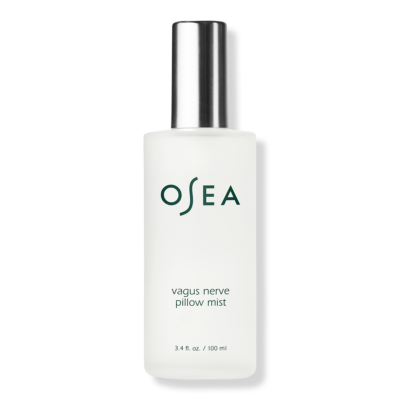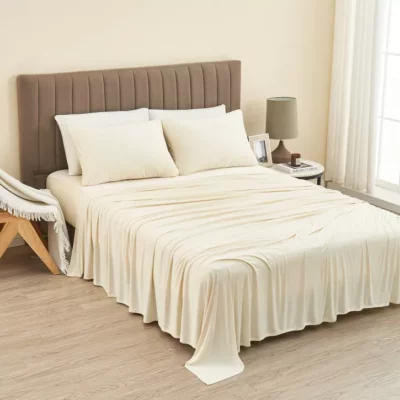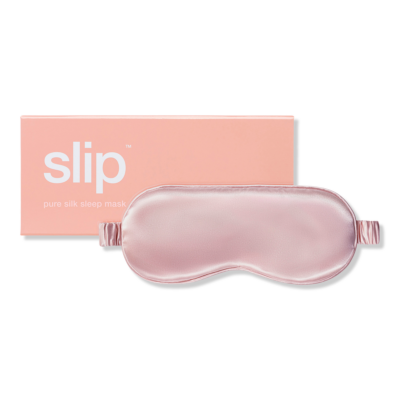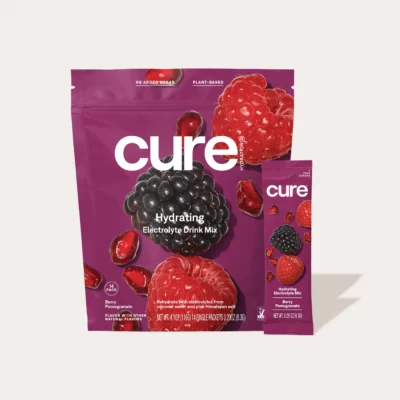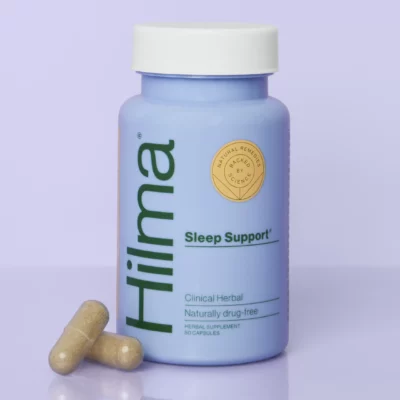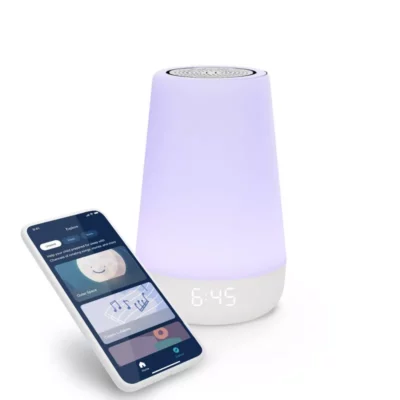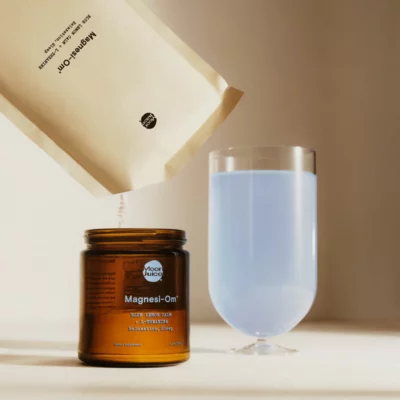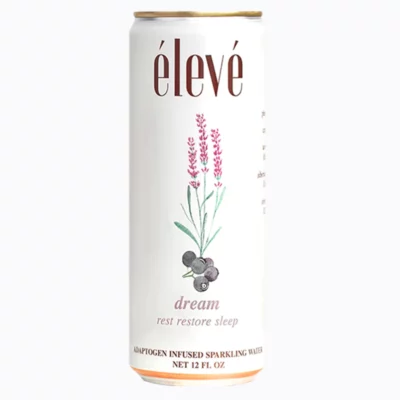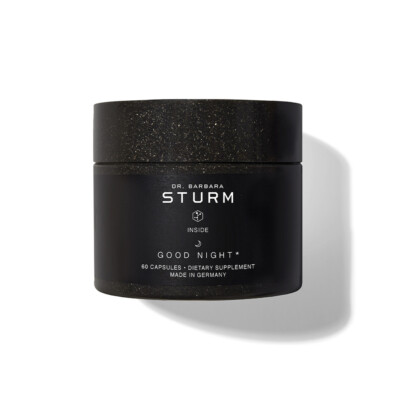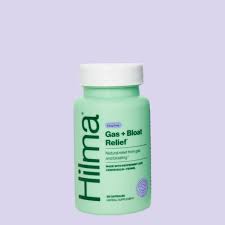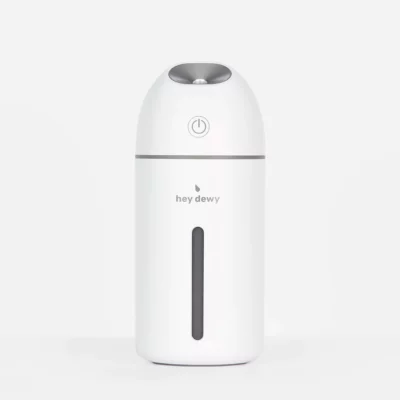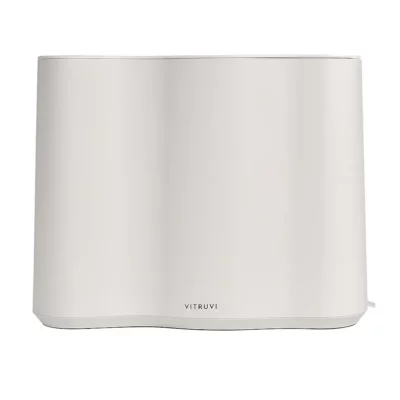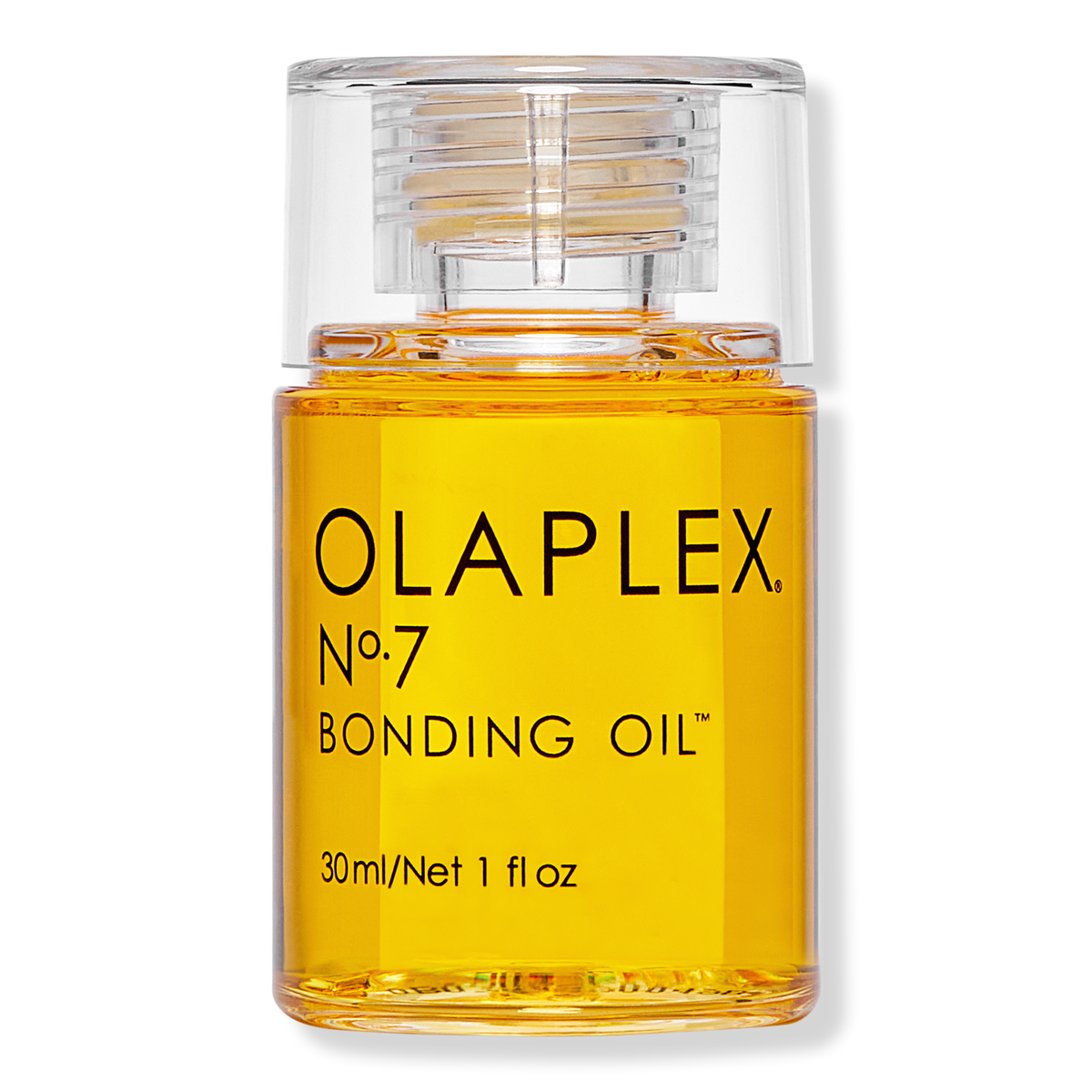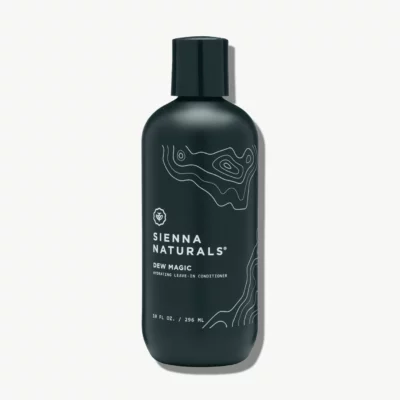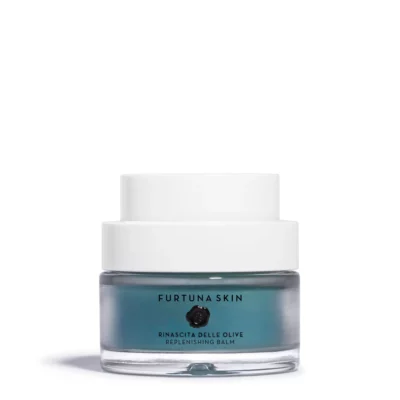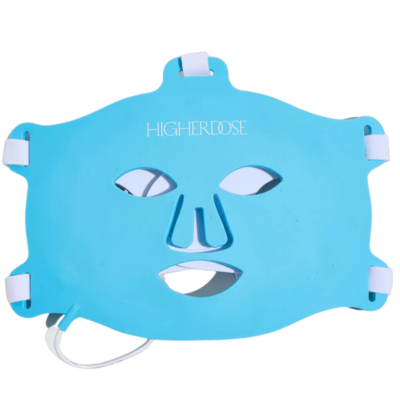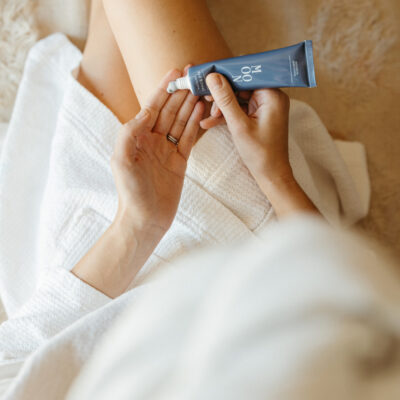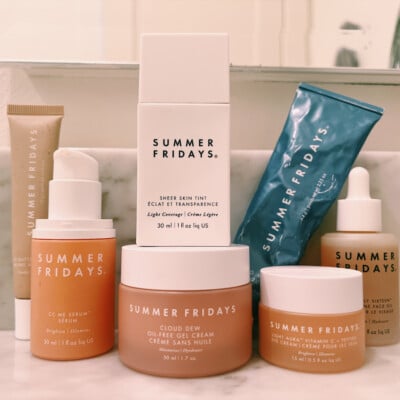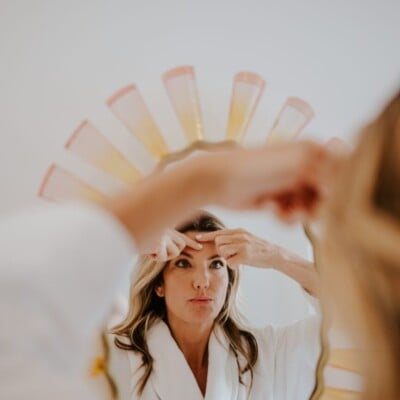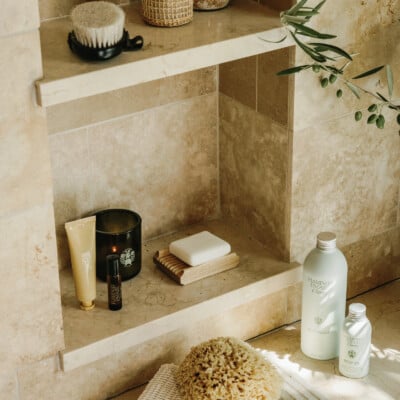We may receive a portion of sales if you purchase a product through a link in this article.
As I write this, I can feel the effects of prolonged, poor sleep. Once every few months, everything converges upon me at once, and, despite my best-laid plans, I end up sacrificing sleep for a few days —or even weeks. Whether you have a hectic family, career obligations, or the Sunday scaries are keeping you awake, you know that poor sleep is impossible to hide. “You look tired,” is devastating to hear. And while some days there’s nothing for it but heroic amounts of concealer (shoutout to the concealers that cover without caking), the best solution is a solid beauty sleep routine.
From simple fixes like sleeping on your back to TikTok hacks like mouth taping, many small things might can improve your sleep. Sleeping deeper, breathing easier, and waking up with glowier skin is all possible by tailoring your sleep routine to your goals.
While overall sleep hygiene is important, I wouldn’t be a beauty editor if I wasn’t curious about maximizing the beauty part of beauty sleep. As I embark on my mission to reset my sleep routine, I spoke to some experts about the things we can do to maximize our beauty sleep routine. And yes, reap all the benefits.
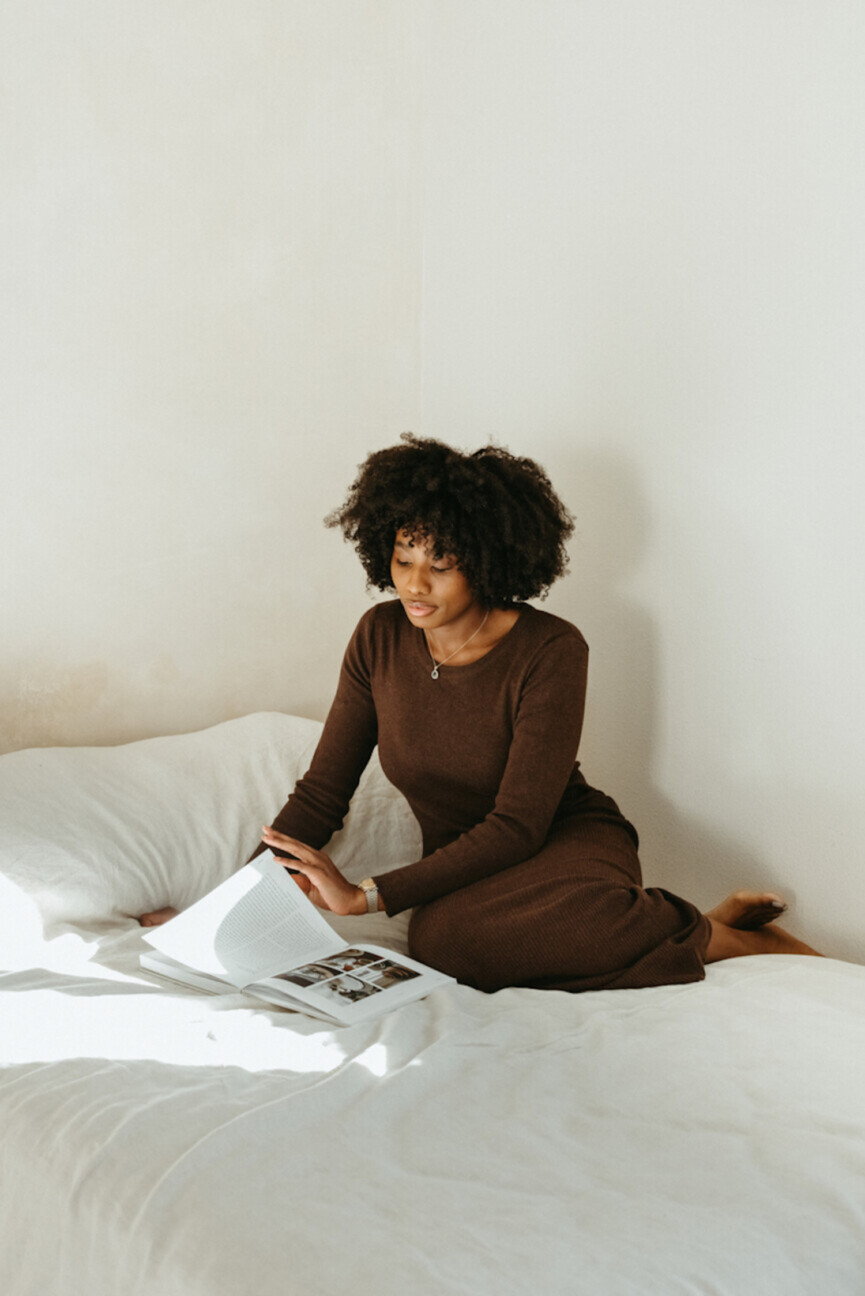
What Your (Lack Of) Sleep Is Really Doing to Your Skin
Sleep, above all, is about repair. When you sleep, your body gets to work resetting—and one thing about me: I love a good reset. This precious time for your body earned its moniker “beauty sleep” because, as your body’s largest organ, your skin goes through a transformation during. It’s why the cardinal sin of skincare is sleeping in your makeup. And it’s why a nighttime skincare routine is one of the most beneficial things you can do for your skin health. So, at a bare minimum, make sure to wash your face and apply an overnight moisturizer!
Your skin soaks up the nourishing products you apply at night and produces natural oils. At a minimum, you should cleanse your skin and apply your moisturizer. Your skin is also busy repairing damage, receiving nutrients from your blood, and rejuvenating itself for the morning.
But slugging and retinol are not the only things you can do to help transform your complexion overnight. From lymphatic drainage before bed to infrared therapy, our experts recommend some possible additions to your sleep routine. Read on to discover how to optimize your beauty sleep to wake up looking refreshed. And remember: take what you need and leave what you don’t.
Meet the Experts
Dr. Kami Parsa, Beverly Hills Oculoplastic Surgeon
Gabriel A. Sher: Chief of Acupuncture and TCM Development at ORA
Dr. Claudia Aguire: PHD + Neuroscientist
Is beauty sleep a real thing?
According to Beverly Hills Oculoplastic Surgeon, Dr. Kami Parsa: “Not getting enough sleep can affect various aspects of your appearance, including your skin, eyes, and overall facial expression, making you look tired and less refreshed.”
Dr. Parsa explains that if you’re not getting enough sleep, you might notice:
- Dark Circles and Puffiness. When you don’t get enough sleep, blood vessels under the eyes can dilate, causing dark circles to become more prominent. Additionally, fluid can accumulate under the eyes, leading to puffiness and a “tired” look.
- Paleness. Sleep deprivation can reduce blood flow to the skin, making it appear paler and less vibrant.
- Fine Lines and Wrinkles. Chronic lack of sleep can reduce collagen production, resulting in the premature formation of fine lines and wrinkles.
- Bloodshot Eyes. Sleep deprivation may also lead to red or bloodshot eyes, which can be caused by irritation, dryness, or inflammation of the blood vessels in the eyes.
- Dull Skin. The skin’s natural rejuvenation and repair processes occur during deep sleep, so insufficient sleep can make the skin appear dull and lackluster.
- Facial Expression. Tiredness can lead to drooping eyelids, sagging mouth corners, and an overall less alert and lively appearance.
- Increased Stress. Lack of sleep can elevate stress levels, releasing stress hormones like cortisol. These hormones can negatively impact the skin’s health and appearance.
- Poor Skin Health. When you consistently lack sleep, your skin doesn’t have enough time to repair itself and maintain its natural glow.
But it’s not just about the external effects on your skin. Suboptimal sleep can sabotage your overall skin health. That means even a few good nights of sleep won’t be enough to fix it. “In addition to dark circles and puffy eyes as the first signs of sleep deprivation, skin hydration, skin barrier function, and skin elasticity are also decreased by sleep deprivation,” says Dr. Claudia Aguire.
“Getting less than seven hours or more than nine hours, waking in the middle of the night, not getting enough early morning dreaming, all of this can be considered suboptimal. So, tidying up our sleep hygiene is key to optimal health.
The Benefits of Quality Sleep
“Our bodies restore different organs at specific times during the night. To provide proper nourishment and restoration, we need to be in a deep sleep,” says Gabriel A. Sher, Chief of Acupuncture and TCM Development at ORA.
Getting a good night’s sleep is one way to approach beauty holistically. It’s not just about skincare, it’s about wellness. According to Sher, our skin sleep impacts our skin and overall well-being. “In Chinese medicine, we must care for the internal and external body Emotions, diet, sleep—these all affect the body. When our bodies are not balanced, we see physical and emotional symptoms get much worse.”
Daily Habits for Better Sleep
Your beauty sleep is built during the day. What you do affects how you sleep.
“Creating a healthy, calming bedtime ritual is super important,” says Sher. “We all know the basic concepts: stay away from your phone, don’t drink fluids too late, and don’t have stressful conversations before bed.”
Sher recommends daily, healthy habits such as:
- Set a bedtime: Keeping a consistent sleep schedule and getting up and going to bed at the same time can help your body intuitively know when it’s time for rest.
- Try journalling: If you have a lot on your mind, write your thoughts down so that your mind has time to rest.
- Practice meditation or breathwork: These can be very effective at calming the mind. I like to incorporate essential oils, like the Campo Sleep oil during my meditation or breathwork as well.
- Choose tea over wine: After dinner, before it gets too close to bedtime, I also like to have a cup of ORA’s Calming Chai herbal tea to help my mind and body relax.
- Add an extra self care step: Pairing this with a warm foot soak infused with calming bath salts is amazing on those nights when you’re feeling overstimulated.
Should You “Go To Bed Ugly”
Beauty sleep has become buzzy recently thanks to social media. The phrase du jour is that you have to “go to bed ugly” to wake up looking your best. This includes elaborate overnight beauty products that work as you sleep. From face-sculpting tools to semi-permanent makeup, this practice takes beauty sleep to the next level.
Intrigued? To try the “go to bed ugly” trend, some fun habits to implement are:
- Mouth tape: This science-backed habit is a wellness hack that could transform your sleep. Mouth tape doesn’t just improve sleep quality in the short term, over time it can reduce inflammation and snatch your jawline.
- Chin straps: Want a more sculpted jawline now? Sleeping with a chin strap is the new hot girl habit that might give you a jumpscare in the mirror, but is well worth it. Pro tip: When you unwrap your chin strap, follow up with a cold gua sha to really see a difference.
- Collagen masks: Supercharge your collagen banking with an overnight collagen masks. These hydrogel masks are an upgrade to sheet masks and give you that “glass skin” effect overnight.
- Lip stain: Lip stains aren’t just for day-long wear. Use an overnight lip stain as a lip liner for long-lasting definition and a natural-looking out.
- Hair curlers: Whether you use rollers or socks, overnight heatless curls can give you the blowout look without a tedious morning hair routine or heat damage.
- Silk bonnet: To protect your hair overnight, sleep in a silk bonnet. I’ve been doing this since I was a kid and cannot imagine going to bed without protecting my curls. Bonus points if you use a hair oil underneath to strengthen your strands.
- Self-tanner: You’ve heard of contouring, but self-tanner contouring is a stroke of genius. By using overnight tanner to “paint” your contour on, you get that sculpted look without a long morning makeup routine.
- Eyebrow tint: Using an eyebrow tint solution before bed can help define your eyebrows instead of filling them in. Some people even use gentle beard dyes for their eyebrows — if it work, it works!
Seems a little extra? Maybe. But if you’re looking for a Princess Diaries style makeover overnight, this is the closest you’ll get.
Nighttime Routines for Better Beauty Sleep
While the above viral quick fixes might be satisfying to watch — or useful to try before a big event — they’re pretty unsustainable for daily life. Instead of trying to curate an elaborate overnight makeover, focus on building an effective sleep routine that gives you good, consistent results.
What does a good sleep routine look like? “For me, it means listening to what your body needs and creating routines to adhere to, so you always have time slotted for self-care.”
Dr. Aguire recommends the following evening habits to optimize your beauty sleep. Try a few at a time and see what sticks!
- Wind it down. In the evening, do more relaxing activities and get your room in the mood for sleep. Having a relaxation routine like taking a warm bath, spraying your pillows with lavender scent, or reading a book by a warm-toned light (no bright white LEDs) can set the scene for sleep onset.
- Stay cool. Providing the optimal room temperature is a key component of healthy sleep hygiene. The National Sleep Foundation suggests that the ideal temperature is between 60 and 67 degrees, a range that takes into account different age groups.
- Stay dark. Use darkening curtains, shades or an eye mask to create enough darkness to bump up your natural melatonin.
- Stay hydrated. Drink a little water as we lose skin hydration at night the most. Drop in a couple of Hilma sleep support if you want to ease into sleep.
- Get comfy. Depending on the weather, use natural fabrics to either keep cool or stay warm in bed so you don’t wake unnecessarily.
- Sound. Use low sound frequencies to get deeper sleep. The hypnotic tones can help you fall asleep.
More Ways to Optimize Your Beauty Sleep Routine
Try a Sleepy Girl Mocktail
Here’s a TikTok trend we can get behind. The sleepy girl mocktail is a blend of pure tart cherry juice, magnesium powder, and digestive soda like an OLIPOP. The natural melatonin and L-theanine from the cherry juice combine with the digestive powers of OLIPOP for a yummy and beautifying treat. Choose a magnesium powder that gives you glowy skin when you wake up.
Take a Sleep Supplement
Sleep supplements aren’t just for getting you to sleep. The most effective options work while you’re resting to maximize your beauty sleep with nourishing ingredients and even help debloat or hydrate as you rest.
Use a Humidifier
A humidifier combines wellness and beauty benefits. It can relieve congestion, ease allergies, and stop snoring. It also keeps your skin moisturized to prevent excess dryness as you sleep.
Do a Hair Mask
Make the most of your nighttime routine by letting a hair mask sit in your strands overnight. Choose a leave-in conditioner or a hair mask for a more intensive treatment. Or try hair oiling every other night for shinier, thicker locks.
Optimize Your Overnight Skincare
Slather on occlusive creams for slugging. Start a nightly sculpting ritual. Use a red light mask. Prepping your nighttime skincare routine to set you up for better sleep pays dividends while you rest.

